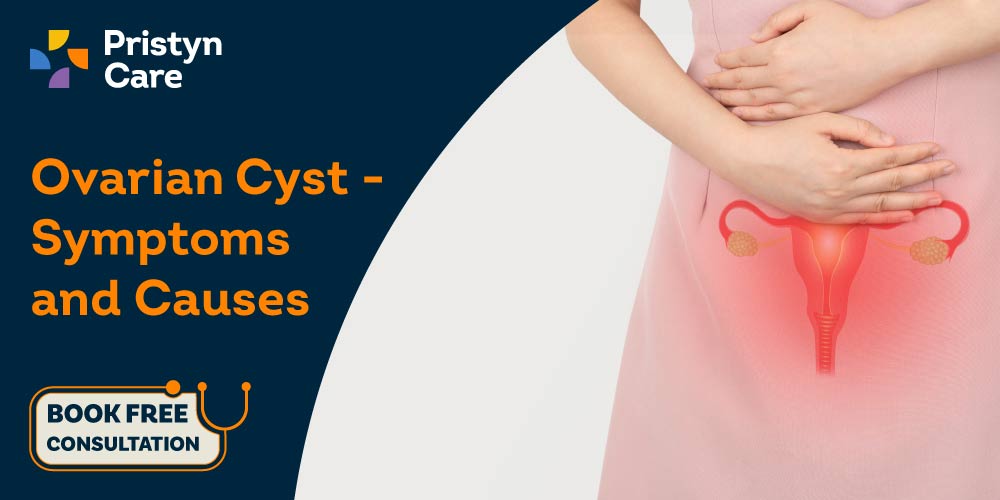What is an ovarian cyst?
ovarian cyst They are benign, fluid-filled sacs that form within the ovaries and cause less discomfort. In most cases, these cysts disappear on their own within a few weeks. Most importantly, ovarian cysts do not affect a woman’s fertility.
These cysts are generally of two types. Functional ovarian cyst When pathological ovarian cystThe former is due to the menstrual cycle, while the latter is caused by abnormal cell proliferation. Both cysts are commonly diagnosed with a pelvic exam or pelvic ultrasound. These cysts are most often benign, but can lead to some complications.
Ovarian cyst symptoms
Most women experience no discomfort from an ovarian cyst and it does not interfere with their daily activities. However, in some cases, these cysts can cause very unpleasant symptoms. These symptoms generally vary from person to person and their severity.So, in that regard, I’ve given some general lists below Ovarian cyst symptoms Things you should be aware of:
- pelvic pain: Pelvic pain, ranging from dull to severe and sharp, is a common symptom of ovarian cysts.
- Some women experience pain and discomfort during sex.
- Increased or frequent need to urinate.
- Constipation or interrupted or delayed bowel movements.
- changes in the menstrual cycle, including irregular periods Also heavy period or lighter period
- Feeling full after eating little or no food
- Abdominal bloating and swelling
- In rare cases, women may face fertility difficulties
- Infected cysts may cause fever
- Sometimes, ovarian cyst May cause unexplained bleeding
In most cases, ovarian cysts heal on their own. but, Surgical removal of ovarian cysts It may be necessary in some cases. Your doctor will perform several diagnostic tests based on your symptoms to understand the severity of your symptoms and rule out potential complications. Treatment is chalked out only after a thorough analysis of symptoms, physical examination findings, and diagnostic tests.
read more: Important things to know before ovarian cystectomy surgery
When should I have surgery for an ovarian cyst?
Ovarian cysts are harmless i.e. benign and do not affect your body fertility. of Ovarian cyst symptoms Generally manageable. However, in some cases, these cysts can cause startling symptoms that require urgent medical intervention. You should see a doctor immediately if you have any of the following symptoms:
- Sudden, excruciating abdominal or pelvic pain that does not go away
- The skin is cold and sticky, with rapid breathing and lightheadedness. These may be signs of shock.
- Fever and vomiting, excruciating pain.
Causes of ovarian cysts
Ovarian cysts are more common in women who have normal periods, but they are also common in postmenopausal women. As explained, There are two types of ovarian cysts, functional and pathological. Both of these cysts can be caused by a variety of factors. Let’s understand the causes of both of these types of ovarian cysts.
Causes of functional ovarian cysts:
Functional ovarian cyst Because it is associated with the menstrual cycle, it primarily affects women who have not gone through menopause. The ovaries release eggs each month that are protected by follicular structures. This follicle fills with fluid that keeps the egg safe and bursts when the egg is ready to be released. If the sac does not release the egg, or if it does release the egg but does not drain fluid, the cyst may swell and form a cyst. Functional cysts are generally not a cause for concern and do not cause serious symptoms. These cysts are very common and go away without treatment.
Causes of pathological ovarian cysts:
pathological ovarian cyst It is formed by abnormal cell proliferation and is not associated with the menstrual cycle. Cells that make eggs, or cells that line the outside of the ovaries, lead to the development of these cysts. Occasionally, these cysts enlarge or rupture, limiting the blood supply to the ovaries. These cysts can be benign, malignant, or borderline. If the cyst is malignant, your doctor may recommend surgery. Also, these cysts can occur before or after menopause.
Certain other factors, such as some underlying conditions, can also lead to the formation of ovarian cysts. endometriosis A condition in which tissue that lines the uterus grows inside the uterus. Occasionally, blood-filled cysts begin to form in this tissue. PCOS (Polycystic Ovary Syndrome) Another condition in which cysts form in the ovaries.
Risk factors for ovarian cysts
There are several factors that can put you on the increase Risk of developing ovarian cystsThese risk factors include:
- hormonal problems
- pregnancy
- endometriosis
- serious pelvic infection
- History of ovarian cyst
Experience Ovarian cyst symptoms? please do not worry! Get in touch with an experienced gynecologist at Pristyn Care Get an accurate diagnosis and treatment! Book now by calling us directly or filling out the form on our website.
https://www.pristyncare.com/blog/ovarian-cyst-symptoms-and-causes/ Ovarian cyst – symptoms and causes
